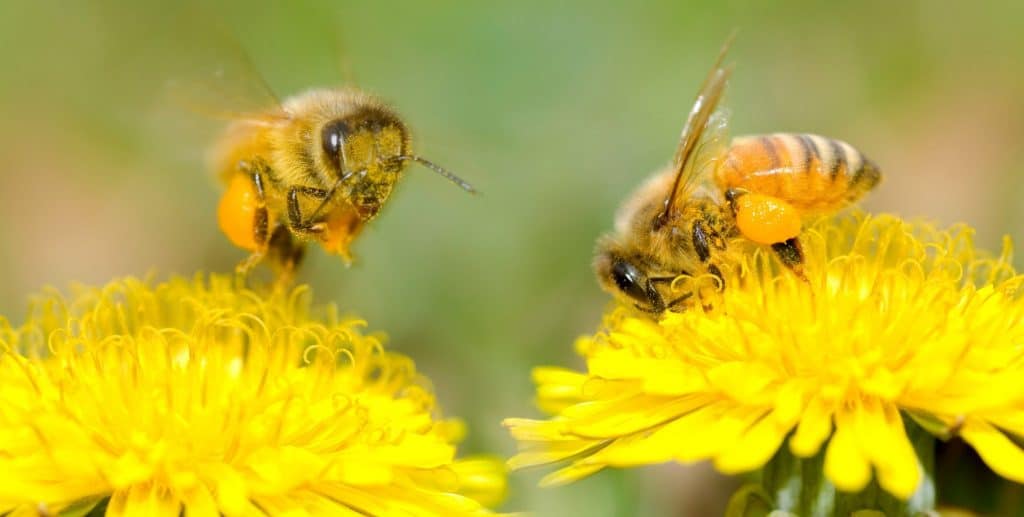The Role Of Bees In Pollination And Crop Production

Pollination is the transfer of pollen from the male parts of a flower to the female parts of the same or another flower, leading to fertilization and seed production. It is a crucial step in the reproduction of flowering plants and crops. Without pollination, many plant species, including important food crops, would not be able to reproduce and survive.
The process of pollination starts with the production of pollen grains by the male parts of a flower called the stamen. These pollen grains are then transferred to the female parts of the flower, known as the pistil. This transfer can occur in various ways, including wind, water, or with the help of animals, especially insects and birds.
One of the most common forms of pollination is known as insect pollination. Bees, butterflies, beetles, and other insects play a crucial role in the pollination process. As they move from flower to flower in search of nectar and pollen, they inadvertently transfer pollen from the stamen to the pistil, ensuring fertilization and seed formation.
But why is pollination so important in farming? Well, the answer lies in the fact that pollination directly affects crop yield. When flowers are successfully pollinated, they develop into fruits or seeds, which are the desired products in many agricultural practices. Without effective pollination, the yield of crops would be significantly reduced, leading to economic losses for farmers.
What is even more fascinating is the mutualistic relationship between pollinators and plants. As pollinators collect nectar and pollen from flowers, they obtain a valuable source of food. In return, they unintentionally transfer pollen from one flower to another, ensuring the reproductive success of the plant. This symbiotic relationship has evolved over millions of years and is a perfect example of nature's intricate balance.
Ideas For maximizing the benefits of pollination in farming, farmers can take certain measures to attract and support pollinators. One way is by planting flowering plants that provide nectar and pollen sources throughout the year. Creating a diverse and pollinator-friendly habitat will encourage these beneficial insects to visit the farm regularly.
Another idea is to avoid or minimize the use of pesticides that can harm pollinators. Chemical pesticides can have detrimental effects on pollinators, leading to declines in their populations. Adopting organic farming practices or using integrated pest management strategies can help minimize the negative impact on pollinators while still ensuring the productivity of crops.
Recommendation For farmers who depend on pollination for their crops, it is essential to understand the specific requirements of the pollinators. Different pollinators have different preferences for flowers, and providing a variety of flower species can attract a diverse range of pollinators. Additionally, creating nesting sites and shelters for pollinators, such as bee hotels or butterfly houses, can further enhance their presence on the farm.
Listicle of the benefits of pollination in farming:
- Increased crop yield: Effective pollination leads to better fruit and seed formation, resulting in higher crop yields.
- Diverse food production: Pollination enables the production of a wide variety of fruits, vegetables, nuts, and seeds, contributing to a diverse and nutritious food supply.
- Economic value: Pollinator-dependent crops have significant economic value, both nationally and globally, contributing to job creation and revenue generation.
- Biodiversity conservation: By supporting pollinators, farmers indirectly contribute to the conservation of biodiversity, as pollinators play a crucial role in maintaining healthy ecosystems.
- Ecosystem services: Pollinators provide valuable ecosystem services, such as maintaining plant communities, enhancing soil fertility, and supporting wildlife populations.
- Genetic diversity: Pollination promotes genetic diversity within plant populations, making them more resilient to environmental changes and diseases.
- Honey production: Bees, one of the most common pollinators, also produce honey, which is a valuable agricultural product with numerous health benefits.
- Seed production: Pollination ensures the production of viable seeds, which are essential for the multiplication and propagation of many plant species.
- Aesthetic value: Flowering plants and their pollinators create visually appealing landscapes, attracting tourists and enhancing the beauty of agricultural areas.
- Environmental sustainability: Supporting pollinators through sustainable farming practices contributes to overall environmental sustainability and conservation efforts.
Question & Answer:
Q: What are some common examples of insect pollinators?
A: Some common examples of insect pollinators include bees, butterflies, flies, wasps, beetles, and moths.
Q: Can wind also be a form of pollination?
A: Yes, wind can be a form of pollination, especially for plants with small and lightweight pollen grains that can be easily carried by the breeze.
Q: Are all flowers capable of self-pollination?
A: No, not all flowers are capable of self-pollination. Some flowers rely on cross-pollination, which requires the transfer of pollen from one flower to another.
Summary of the process of pollination:
In summary, pollination is a crucial process in farming that involves the transfer of pollen from the male parts of a flower to the female parts. It is essential for the reproduction and yield of flowering plants and crops. Various mechanisms, including insects, birds, wind, and water, facilitate pollination. Farmers can enhance pollination by attracting and supporting pollinators, avoiding pesticide use harmful to pollinators, and providing a diverse range of flowers. Pollination has numerous benefits, including increased crop yield, diverse food production, economic value, biodiversity conservation, and ecosystem services. It also contributes to genetic diversity, honey production, seed formation, and environmental sustainability. Understanding the importance of pollination and implementing strategies to support it is vital for the success and sustainability of farming practices.
Post a Comment for "The Role Of Bees In Pollination And Crop Production"